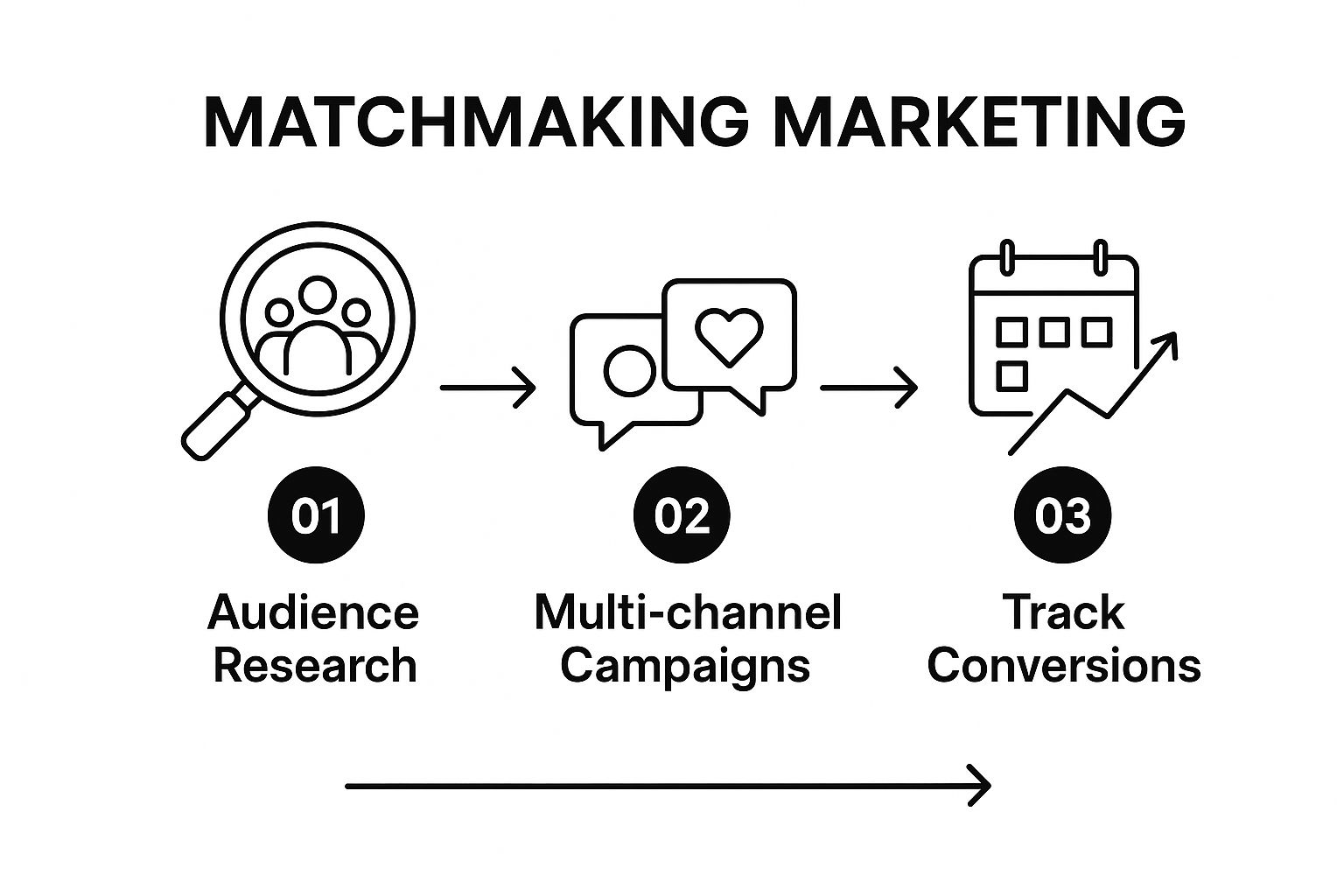How to Start Matchmaking Business: A Complete Guide

So, you’re thinking about starting a matchmaking business. It's a fantastic venture that blends intuition, business savvy, and a genuine desire to help people connect. At its core, it's about defining your unique approach, handling the legal stuff, and crafting a client journey that feels personal and premium from the first hello to the final introduction. The real magic lies in building a brand people trust and offering a deeply human alternative to the endless swiping on dating apps.
The Resurgence of Personalized Matchmaking

In a world drowning in dating apps and digital noise, people are craving something real. The burnout is palpable. This growing "swipe fatigue" has opened up a huge opportunity for entrepreneurs who truly understand the art of building relationships. We're moving away from the algorithm-driven, quantity-over-quality game. Today’s singles, especially busy professionals, are more than willing to invest in a high-touch, personalized service that actually delivers.
This is where you come in. Learning how to start a matchmaking business isn't just about playing Cupid. It’s about building a trusted brand, mastering the delicate dance of client relationships, and creating a curated experience that a machine could never hope to replicate.
Understanding the Market Opportunity
This demand for a personal touch isn't just a hunch—the numbers back it up. The global matchmaking market was valued at around $8.5 billion in 2023 and is on track to hit $12.9 billion by 2032. This isn't a fluke; it's a clear signal that people want tailored matches that increase their chances of finding a lasting relationship. If you're curious, you can get more insights into the matchmaking market trends and its projected growth.
This boom means a smart matchmaking service can absolutely thrive by offering what the apps can't:
- Deep Personal Insight: You go way beyond a surface-level profile. You take the time to understand a client's core values, life goals, and what truly makes them tick.
- Vetting and Security: You provide a safe, confidential space where every potential match is carefully screened. Peace of mind is a huge selling point.
- Time Savings: Your ideal clients are often high-achievers who simply don't have the time or energy for the frustrating grind of online dating. You do the heavy lifting for them.
The most successful matchmakers don't just find dates; they act as a trusted confidante, coach, and strategist. Your value lies in your emotional intelligence, your network, and your ability to see connections others might miss.
The Core Pillars of Your Business
Before we get into the nitty-gritty, let's nail down the foundations. These are the non-negotiable pillars that will hold up your entire business, turning it from a simple hobby into a professional consultancy.
Think of this table as your initial checklist. Each pillar is a critical area you'll need to flesh out to build a reputable and sustainable service. Getting these right from the start is absolutely paramount.
Core Pillars of Your Matchmaking Business
| Business Pillar | Key Focus | Example Action |
|---|---|---|
| Niche & Brand Identity | Defining who you serve and what makes you unique. | Specializing in matching creative professionals over 40. |
| Legal & Financial Structure | Setting up the business correctly to protect yourself and your clients. | Registering an LLC and opening a dedicated business bank account. |
| Service Packages & Pricing | Creating clear, value-driven offerings. | Designing tiered packages (e.g., a 3-month search vs. a 6-month premium). |
| Client Process & Workflow | Mapping out the entire client journey from start to finish. | Creating a multi-step onboarding process with in-depth interviews. |
| Technology & Tools | Selecting the right software to manage clients and data securely. | Implementing a CRM like Bonsai to track client interactions. |
| Marketing & Client Acquisition | Developing a strategy to attract your ideal clients. | Building a professional website and running targeted LinkedIn ads. |
With these pillars in place, you have a solid framework. Now, we can start building out the detailed roadmap in the sections to come.
Finding Your Niche in the World of Love

Let’s get one thing straight: trying to be the matchmaker for everyone is a surefire way to fail. The market is just too big, and a generic, one-size-fits-all approach makes you invisible. The most successful matchmaking businesses I’ve seen? They're laser-focused on a specific slice of the population where they can become the undisputed expert.
This focus—your niche—isn’t just about targeting a demographic. It's about deeply understanding their world, their unique challenges, and what they’re truly looking for in a partner. It’s what allows you to craft every part of your business, from marketing copy to client interviews, to connect with a very specific group of people.
The dating industry is booming. We’re talking about a massive pool of singles, with roughly 350 million people worldwide using dating apps in the early 2020s. The market itself was valued at $7.22 billion in 2023 and is on track to smash past $13 billion by 2030. That’s a whole lot of people looking for a better way to find love—and plenty of room for you to carve out a profitable niche.
Why a Niche Is Non-Negotiable
Without a clear niche, your marketing becomes a chaotic, expensive mess. You’ll struggle to explain what makes you different, and potential clients won't see why they should choose you over anyone else. Nail down your niche, and these problems disappear.
Here’s what a sharp focus gives you:
- Become a Go-To Expert: When you're the matchmaker for "tech executives in Austin" or "divorced parents over 50," you build authority and credibility almost overnight.
- Streamline Your Marketing: You suddenly know exactly where your ideal clients hang out online, what they read, and which social media platforms are worth your time.
- Charge Premium Prices: Specialization screams expertise. Clients are more than willing to pay top dollar for a service that genuinely understands their world and their needs.
A strong niche is your business’s best filter. It doesn’t just attract your dream clients; it actively repels people who aren't a good fit. This saves you an incredible amount of time and energy, ensuring you only work with people you can truly help.
Brainstorming Your Ideal Matchmaking Niche
Finding your sweet spot is a mix of looking inward and looking outward. The perfect niche usually lies at the intersection of your passions, your professional network, and a real, unmet market need.
Kick things off by asking yourself some honest questions:
- Who are you genuinely passionate about helping? Do you connect with creatives, entrepreneurs, academics, or people from a specific faith?
- What communities are you already a part of? Your past career, hobbies, or social circles can be an absolute goldmine for finding your first clients.
- What underserved groups are in your area? Look around. Is there a big population of young professionals, LGBTQ+ singles, or active retirees with very few dating options built for them?
You can slice and dice a market in countless ways—by geography, demographics (age, income), psychographics (lifestyle, values), or even behavior. The most powerful niches often blend a couple of these. Think "environmentally-conscious professionals aged 30-45 in the Pacific Northwest." Now that's specific.
From Niche Idea to Business Model
Once you’ve landed on a potential niche, you have to validate it. Is the group large enough to be profitable but small enough for you to dominate? More importantly, are these people willing and able to pay for matchmaking?
To really get inside their heads, the process of creating effective buyer personas is invaluable. This exercise turns a vague demographic into a detailed profile of a real person, complete with their goals, frustrations, and motivations.
Your niche will directly shape your entire business model, especially your services and pricing.
| Niche Example | Potential Business Model | Service Style |
|---|---|---|
| High-Net-Worth Individuals | High-End Retainer | Exclusive, white-glove service with global search capabilities. |
| Busy Young Professionals | Subscription or Package | Structured 3 or 6-month programs with date coaching included. |
| Specific Religious/Cultural Group | Hybrid (Membership + Match Fee) | Community-focused, with events and vetted introductions. |
For instance, a service for busy tech execs would likely thrive on a high-end retainer model. These clients value their time above all else, so your service would be built around efficiency, discretion, and impeccably vetted introductions.
On the other hand, a matchmaker for "creatives over 40" might find more success with a package-based model that includes workshops on rebuilding dating confidence alongside the matches. Your niche is the strategic heart of your business. Get this right, and everything else just falls into place.
Building a Business That Inspires Trust

Let’s be honest. High-caliber clients are drawn to professionalism and stability. Before you can ask someone to trust you with their love life—and their hard-earned money—you have to build a business that feels absolutely solid.
This isn't just about having a great idea. It means creating the real-deal legal and operational framework that protects you and your future clients. Think of this as the non-negotiable foundation. It’s what tells the world you’re a serious professional who gets how important this work truly is.
Laying the Legal Groundwork
Your first big decision is choosing a business structure. You could operate as a sole proprietor, but forming a Limited Liability Company (LLC) is a much savvier move for a matchmaking business. Why? Because an LLC creates a legal wall between your personal assets (your home, your savings) and your business liabilities.
That separation is critical. If a client ever decided to take legal action, only your business's assets would be on the line, not your personal ones. It's a fundamental layer of protection that lets you operate with peace of mind.
Setting up an LLC is surprisingly straightforward in most places. The process usually involves a few key steps:
- Picking a unique business name that isn’t already claimed in your state.
- Filing your articles of organization with the state’s business agency.
- Naming a registered agent who can receive official legal mail.
Getting this initial paperwork done pays off in a huge way. It sends a clear signal to potential clients: you’re established, professional, and here to stay.
Crafting a Brand That Resonates
Once the legal stuff is handled, you can dive into the fun part: your brand identity. This is so much more than a slick logo. It’s the entire experience you offer. Your brand needs to speak directly to the niche you’ve chosen, making your ideal client feel like you just get them.
A powerful brand identity includes:
- A Professional Website: This is your digital front door. It must be clean, modern, and clearly explain what you do, who you serve, and how you do it.
- A Memorable Name and Logo: Your name should be easy to recall and reflect your brand's vibe—whether that’s exclusive and luxurious or warm and approachable.
- Consistent Messaging: The way you write on your website, your social media, and in your emails should all have the same tone and speak to the clients you want to attract.
Think of your brand as the promise you make. A sophisticated, trustworthy brand is a magnet for sophisticated, trusting clients.
The Client Agreement: Your Most Important Document
Your client agreement is, without a doubt, the most critical piece of paper in your business. It's not just a legal formality; it's a tool for building trust and managing expectations right from the start. A well-written contract prevents messy misunderstandings and lays out a clear roadmap for your relationship.
A detailed, transparent client agreement is your best friend. It protects you from liability, clarifies your responsibilities, and gives clients the confidence to invest in your services by showing them you've thought of everything.
This agreement needs to be thorough, covering every part of your service. It’s worth every penny to work with a lawyer to draft a document that’s legally sound and fits your unique business model.
Here are the non-negotiable clauses you must include:
- Scope of Services: Spell out exactly what you will and will not do. Specify the number of introductions, the length of the contract, and any extras like date coaching.
- Payment Terms: Clearly state your fees, the payment schedule, and any late payment policies. Be direct about your refund policy—most matchmakers have a no-refund policy, and this needs to be crystal clear.
- Confidentiality Clause: Your clients are sharing incredibly sensitive information. A rock-solid confidentiality clause reassures them that their privacy is your top priority.
- Client Responsibilities: Outline what you need from them. This includes things like providing prompt feedback after dates and being totally honest in their communications. Safety is a two-way street, and you can find more guidance by reviewing important online dating safety tips.
- Disclaimer of Guarantees: This one is huge. Be perfectly clear that you do not guarantee marriage, a long-term relationship, or "love." Your job is to make qualified introductions and offer expert guidance—you can't manufacture chemistry.
This document sets the stage for a professional, transparent, and trusting partnership. And that is the absolute cornerstone of a successful matchmaking business.
Crafting Your Signature Matchmaking Process
Your matchmaking process is the absolute heart of your business. It's the tangible, step-by-step journey a client takes, from that very first "hello" all the way to their first introduction. A well-defined process isn't just about keeping you sane and organized; it’s about building rock-solid client confidence. It manages their expectations and, ultimately, delivers the high-touch, premium experience they are paying for.
This is where you turn your unique matchmaking philosophy into a repeatable, professional, and deeply personal series of actions. The goal is a seamless flow that feels both structured and completely bespoke. Your clients should always know what’s coming next, yet feel like the entire experience was designed just for them. Striking that balance is what separates a good matchmaker from a truly great one.
The Initial Consultation: Building Rapport
The client journey starts long before any contracts are signed. That first chat, whether it's a 30-minute call or a coffee meeting, is your golden opportunity to build genuine rapport. Forget the sales pitch. This is a mutual discovery session to see if you're the right fit for each other.
During this conversation, your main job is to listen. Really listen. You need to understand their story, their frustrations with modern dating, and what they're truly hoping to get from working with you. This is also where you subtly establish your expertise and set the stage for a professional relationship built on trust.
A successful consultation always accomplishes three things:
- It validates their feelings: Acknowledge their dating fatigue. Show some real empathy.
- It outlines your philosophy: Briefly explain how you work differently from dating apps, focusing on your personalized, human-first approach.
- It clarifies the next steps: Be crystal clear about what happens next if they decide to move forward.
In-Depth Onboarding: The Art of the Interview
Once a client is on board, the real deep dive begins. The onboarding interview is the cornerstone of your whole process. This is where you go way beyond surface-level stuff like height and hobbies to uncover the core values, communication styles, and emotional needs that actually predict long-term compatibility.
This interview needs to feel like a comfortable, insightful conversation, not an interrogation. Structure your questions to get to the "why" behind their answers.
A classic rookie mistake is just asking clients what they want. Your real job is to help them discover what they need. The two are often worlds apart, and your expertise lies in uncovering that truth.
For instance, instead of asking "What do you do for fun?" try something like, "What activities make you feel most alive and connected to yourself?" This reframes the question to get at their passions, not just their pastimes. You can learn more about streamlining these administrative but critical steps by exploring how to automate repetitive tasks, which frees you up to focus on the human connection.
The Search and Vetting Protocol
Armed with a deep understanding of your client, the search begins. This is the behind-the-scenes magic that proves your value. Your search protocol should be multi-faceted—tapping into your personal network, your database of singles, and maybe even some discreet scouting at relevant events or online.
Every single potential match must go through a rigorous vetting process. This is non-negotiable. It protects your client and upholds the integrity of your entire service.
Your vetting protocol should include:
- A comprehensive profile review to make sure their information aligns with your client's non-negotiables.
- A personal interview with the potential match to get a feel for their personality, intentions, and communication style.
- Basic verification checks, which can range from confirming employment to more formal background checks, depending on your service level.
This visual shows how you can start attracting potential matches into your vetting funnel with smart marketing.

As you can see, successful client acquisition always starts with deep audience research before you even think about launching campaigns.
Presenting the Match and Gathering Feedback
How you present a potential match is an art form. Don't just fire off a photo and a short bio. Craft a thoughtful presentation that explains why you believe this person is a strong potential connection. Highlight the shared values, complementary life goals, or similar personality quirks you picked up on during your interviews.
After the introduction is made and a date happens, the feedback loop becomes critical. You absolutely must schedule a post-date debrief with your client to talk about how it went. This chat isn't just about getting a "yes" or "no" for a second date; it's a goldmine of information that helps you sharpen your search moving forward.
What did they like? What felt off? Their feedback, good or bad, is what makes the next match even better.
Okay, you’ve got your business structure sorted and a killer process ready to go. Now for the make-or-break part: getting your first high-quality, paying clients through the door. This is often where new matchmakers get stuck, but it doesn't have to be a grind.
The trick is to stop thinking like a typical marketer casting a wide net. Your job is to be a magnet for the exact people you’re meant to serve. This means creating a polished online presence that works hand-in-hand with powerful, real-world networking.
Building Your Digital Foundation
Think of your website as your digital storefront. For a high-end service like matchmaking, it has to look the part. It needs to be professional, clean, and speak directly to the specific problems and desires of your ideal client. A sophisticated design builds instant trust and signals to visitors that they’ve found a premium service.
But a beautiful website is just the start. You need a strategy to actively draw people in. This is where you need to get smart with digital marketing. To make sure local singles can actually find you, digging into effective local SEO strategies can turn a simple Google search into your next success story.
And don't forget social media—just be strategic about where you spend your time:
- LinkedIn: An absolute goldmine for connecting with successful professionals, executives, and other high-earners. Share insightful content about leadership, work-life balance, and relationship dynamics to position yourself as an authority.
- Instagram: If your ideal clients are more lifestyle-focused (think creatives or wellness gurus), Instagram is your playground. Use it to build a brand around your unique matchmaking philosophy, sharing valuable tips and client wins (always with permission, of course).
The Power of Content and Authority
One of the most effective ways to attract clients is to show them you know your stuff. This is where content marketing comes in. Starting a blog is a fantastic way to establish yourself as a thought leader in the relationship world.
Write about topics that your ideal client actually cares about. For instance, if you’re targeting busy entrepreneurs, you could write articles like "How to Balance a Demanding Career and a Thriving Love Life" or "The Non-Negotiable Traits Successful People Look for in a Partner." This kind of content does more than just bring people to your site; it pre-qualifies them by showing you genuinely understand their world.
Your marketing should feel less like a sales pitch and more like a generous offering of expertise. When you give valuable advice freely, people naturally begin to trust you and will be far more likely to invest in your paid services when the time is right.
Strategic Offline Networking and Partnerships
While your online presence is crucial, don't underestimate the power of offline connections. For a service as personal as matchmaking, the trust that comes from a real-world referral is priceless.
Focus on building a strong referral network with other professionals who already serve your target demographic. These partners can become a steady stream of amazing leads.
Consider connecting with:
- Therapists and Life Coaches: They often work with clients who are emotionally ready to find a partner and are actively working on themselves.
- Divorce Attorneys: Their clients are starting a new chapter and will eventually be looking for a healthier, more intentional way to date.
- Wealth Managers and Financial Advisors: These pros have trusted relationships with affluent individuals who value discretion and professional help.
Hosting small, exclusive events can also be a game-changer. Think curated dinner parties, private wine tastings, or gallery viewings for a select group of eligible singles. This not only provides huge value to your guests but also cements your reputation as a key connector in your community.
Every new client is an investment, so you need to be smart about your spending. It’s a good idea to get a handle on your budget by reviewing our guide on customer acquisition cost calculation.
It’s also smart to keep an eye on the bigger picture. The global dating services market was valued at $9.27 billion in 2024 and is expected to hit $15.33 billion by 2032. A lot of this growth is coming from tech-heavy platforms, but that just creates more demand for a high-touch, human-led service like yours to stand out as the premium alternative.
Got Questions About Starting a Matchmaking Business?
Thinking about launching a matchmaking business brings up a ton of questions. It's totally normal. You're probably wondering about everything from how much you can actually make to what the day-to-day grind really looks like.
Let's cut through the noise and get you some straight answers to the most common questions I hear from aspiring matchmakers.
So, How Much Can a Matchmaker Realistically Earn?
This is the big one, right? The honest answer is that your income can be all over the map. It really boils down to your niche, how you structure your services, and the results you deliver.
When you're just starting out, maybe doing this part-time, you could be looking at something in the $30,000 to $50,000 range annually. As you build your reputation and get a steady flow of clients, that can easily climb to $75,000 to $150,000 a year, or even more.
The real money, though, is in specialization.
Elite matchmakers who cater to high-net-worth individuals or operate in very specific, hard-to-reach niches can charge anywhere from $50,000 to over $250,000 for a single client. At that level, you’re talking about a high six-figure or even seven-figure annual income. Your earning potential is really only capped by the clients you serve and the quality of your work.
Do I Actually Need a Certification to Be a Matchmaker?
I get this question all the time. The short answer is no—there's no government license or universal certification you have to get to legally call yourself a matchmaker. You can hang out your shingle tomorrow without one.
But should you? That's a different story.
Getting certified through a respected organization like the Matchmaking Institute is a smart strategic play. These programs give you a solid foundation in industry best practices, ethics, and the business side of things.
A certification isn't just a piece of paper; it's instant credibility. Clients are trusting you with a deeply personal part of their lives. Seeing that you’ve invested in professional training can be the very thing that makes them choose you over someone else.
Think of it as a trust signal. It shows you’re serious about your craft and gives you access to a network of other professionals—which is gold for finding matches and learning the ropes.
What Are the Biggest Hurdles When You're Starting Out?
Every new venture has its challenges, and matchmaking is no exception. Knowing what's coming is half the battle.
Based on my experience, the two biggest mountains you'll have to climb are finding clients and managing their expectations.
- Getting those first few clients: This is tough. With no success stories to point to, you have to sell yourself and your vision. This is where your personal brand is everything. You'll need to network like crazy and build referral partnerships with people like therapists, divorce attorneys, and financial advisors.
- Managing client expectations: Love is a tricky business. Some clients will secretly hope you have a magic wand. Your job is to be crystal clear from day one—in your marketing, your initial consultations, and especially in your contract. You're not selling a soulmate guarantee; you're offering expert guidance and curated introductions.
Another big one is building your database. That "black book" of high-quality, eligible singles is your most valuable asset, and it takes a ton of time, networking, and hustle to build from scratch. Getting through these early days takes grit, fantastic communication skills, and a genuine belief in the value you're providing.
Ready to streamline your own or your clients' dating journey? The Auto-Swiper extension automates the tedious parts of online dating, so you can focus on making real connections. Discover how it works.

